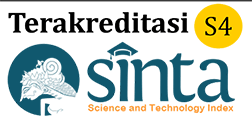Segmenting perceptions of social media's impact on MSMEs using K-means
DOI:
https://doi.org/10.32815/jitika.v19i2.1188Keywords:
digital marketing, k-means clustering, msme, perception segmentation, social mediaAbstract
The rapid growth of social media usage has significantly influenced the marketing and development strategies of Micro, Small, and Medium Enterprises (MSMEs). However, there remains a limited understanding of how various users perceive the role of social media in supporting MSME growth. This study aims to segment user perceptions regarding the impact of social media on MSMEs, utilizing the K-Means Clustering method. The research novelty lies in combining perceptual analysis with an unsupervised machine learning technique to discover hidden patterns in public responses. Data were collected through a questionnaire distributed to MSME actors and users of MSME products across Indonesia. The questionnaire includes statements related to the accessibility, promotional effectiveness, and trust-building capability of social media. The clustering results categorize respondents into several perception groups—ranging from highly positive to neutral or skeptical, providing valuable insights for stakeholders and digital marketing strategists in targeting communication and support for MSMEs. This approach offers a data-driven strategy to optimize MSME empowerment through the appropriate use of digital platforms.
Downloads
References
Afifah, A. F., Setiawan, R. T., Abdullah, V. S. N. H., Febriana, Z. A., & Supriyono, S. (2025). Pengaruh Media Sosial terhadap Penjualan UMKM. Jurnal Pendidikan Tambusai, 9(1), 1285–1290. https://jptam.org/index.php/jptam/article/view/24372
Amelia, M., Faqih, A., & Rinaldi, A. R. (2025). Penerapan Metode K-Means Clustering dalam Pemetaan Kemiskinan Kabupaten/Kota di Indonesia untuk Perencanaan Kebijakan yang Tepat. Jurnal Informatika Dan Teknik Elektro Terapan, 13(2). https://doi.org/10.23960/jitet.v13i2.6231
Darmawan, S. A. D., & Karmilasari. (2024). Penerapan Metode K-Means Clustering dan Simple Moving Average untuk Memprediksi Jenis Penyakit di Provinsi Jawa Timur. Jurnal Teknologi Informasi Dan Ilmu Komputer, 11(4), 877–886. https://doi.org/10.25126/jtiik.1148703
Ramadana, F. D., Pratama, W. P., Yogario, C. L., Khohar, A., & Setiawan, I. (2025). Implementasi Algoritma K-Means Clustering terhadap Tingkat Kepuasan Peserta LKP Multi Talenta Komputer Purwokerto. Mars : Jurnal Teknik Mesin, Industri, Elektro Dan Ilmu Komputer, 3(1), 184–193. https://doi.org/10.61132/mars.v3i1.675
Gustientiedina, G., Adiya, M. H., & Desnelita, Y. (2019). Penerapan Algoritma K-Means Untuk Clustering Data Obat-Obatan. Jurnal Nasional Teknologi Dan Sistem Informasi, 5(1), 17–24. https://doi.org/10.25077/TEKNOSI.v5i1.2019.17-24
Khumairo’, H., Hersiyah, H., & Mashudi, M. (2025). Peran UMKM Dalam Mendorong Pertumbuhan Ekonomi dan Pemerataan Pendapatan Di Indonesia. Ekonomipedia: Jurnal Ekonomi Manajemen Dan Bisnis, 3(1). https://journals.gesociety.org/index.php/ekonomipedia/article/view/274
Kusyadi, I., Putri, M. A., Satria, M. B., & Trihapningsari, D. (2025). Implementation of the K-Means Algorithm to Determine the Classification of River Water Quality in Jakarta Based on Chemical Parameters. Proceeding International Seminar of Science and Technology, 4, 102–109. https://doi.org/10.33830/isst.v4i1.5236
Nabila, Z., Isnain, A. R., Permata, P., & Abidin, Z. (2021). Analisis Data Mining untuk Clustering Kasus COVID-19 di Provinsi Lampung dengan Algoritma K-Means. Jurnal Teknologi Dan Sistem Informasi (JTSI), 2(2). https://jim.teknokrat.ac.id/index.php/sisteminformasi/article/view/868
Wahyuni, S. (2024). Digital Marketing Strategy on Increasing Transaction Volume in MSMEs in the Post-Pandemic Era. International Journal of Economics and Management Research, 3(3), 450–461. https://doi.org/10.55606/ijemr.v3i3.503
Suyadi, S., Syahdanur, S., & Suryani, S. (2018). Analisis Pengembangan Usaha Mikro Kecil dan Menengah (UMKM) di Kabupaten Bengkalis - Riau. Jurnal Ekonomi KIAT, 29(1). https://journal.uir.ac.id/index.php/kiat/article/view/2736
Valentina, M. febri, Putri suci guntari, Sella Jofilla, Abdul gani, Ecsa Triyadi Ramadon, M. Ammar Albarra, & Pujianto. (2025). Penerapan Algoritma K-Means Clustering untuk Analisis Pola Penjualan Toko Kue dengan RapidMiner. Jurnal Mahasiswa Ilmu Komputer, 6(1), 24–34. https://doi.org/10.24127/ilmukomputer.v6i1.7768
Veranita, M., Almamalik, L., & Ikhsan, S. (2022). Pemanfaatan Pemasaran Melalui Media Sosial oleh UMKM Di Era Pandemi (Studi Kasus pada Usaha Mikro, Kecil, Dan Menengah di Kabupaten Bandung). Coopetition : Jurnal Ilmiah Manajemen, 13(1), 89–96. https://doi.org/10.32670/coopetition.v13i1.590
Additional Files
Published
How to Cite
Issue
Section
License
Copyright (c) 2025 Jurnal Ilmiah Teknologi Informasi Asia

This work is licensed under a Creative Commons Attribution 4.0 International License.
Upon acceptance for publication, authors transfer copyright of their article to Jurnal Ilmiah Teknologi Informasi Asia. This includes the rights to reproduce, transmit, and translate the material in any form or medium.
While the editorial board endeavors to ensure accuracy, they accept no responsibility for the content of articles or advertisements. Liability rests solely with the respective authors and advertisers.
Website material is licensed under a Creative Commons Attribution 4.0 International License (CC BY 4.0). Under this license, users are free to share and adapt the material for any purpose, including commercial use, provided license terms are met. These freedoms are irrevocable by the licensor under such conditions.














